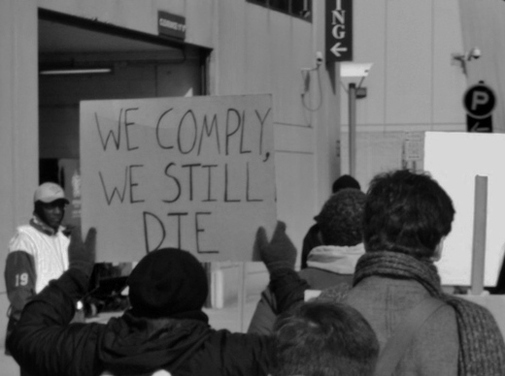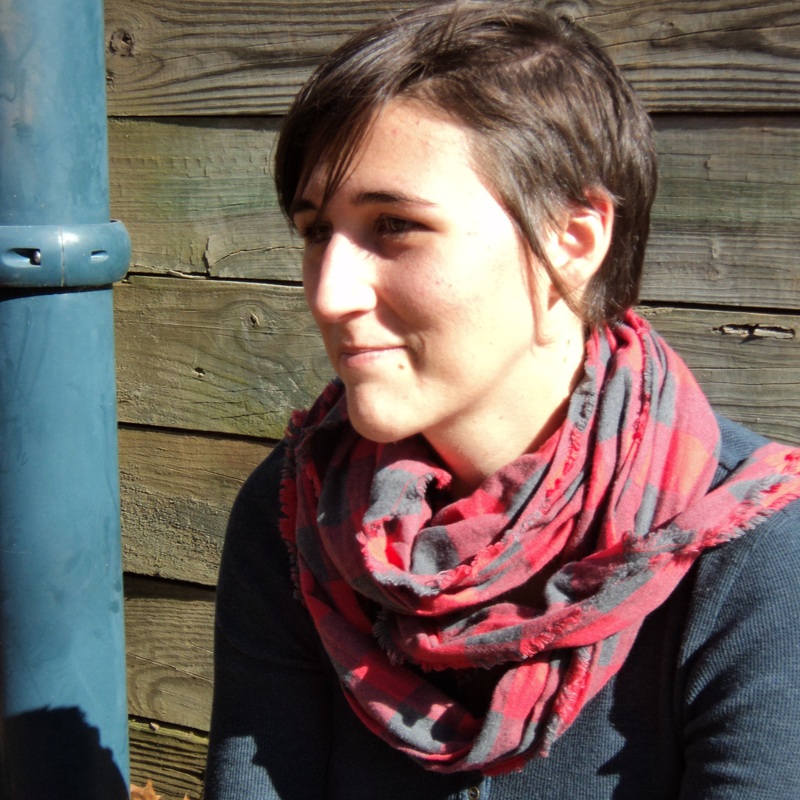|
3/11/2015 Comments Violence is Violence?: Inter-generational Strife, Self-Defense, and the Black Lives Matter MovementBy: HH Brownsmith  HKonJ March in Raleigh, NC. February 14, 2015. HKonJ March in Raleigh, NC. February 14, 2015. The Bible is brimming with instances of people waiting for a prophet or movement only to have that person or mobilization arrive and go unrecognized or, worse yet, be violently suppressed because it doesn’t conform to the expectations of the waiting masses. Since I started working and/or living in radical Christian settings seven years ago, I have heard elders wax nostalgic about the civil rights movement. I have watched older folks who lived during the end of the Jim Crow era weep when discussing their own recognition of that important historical and cultural shift. I have also watched elders chastise young folks, sometimes rightfully, for failing to care about this history; the nonviolent tactics employed; and the ways hearts, minds, and institutions were forever altered. I write about a lot of issues with the marginal confidence of a generalist. But if there is an issue on which my nerve consistently fails it is on the generational tension and resulting divide as it exists in the radical Christian left. This issue of generational conflict feels close…maybe too close. I have watched the “old guard” in established Christian communities push out younger folks for misunderstandings that boil down to generational politics (i.e. democratic socialism vs. anarchism). I have watched young people leave established churches to start generationally homogenous churches of their own. And, of course, I have seen so many people under 40 leave parish ministries and take their seminary training to chaplaincy work or academia. Wondering if perhaps there was something to our elders complaints that young folks are disrespectful and too "now focused", I decided to really seek instruction from "the silent generation". I am a member of a church with only 3 consistently attending members in their 20s (my partner and I are included in that number). I am now employed by that church. And over the last year I was part of an apprenticeship program administered by this church and five of my favorite ministers, all but one of whom is over sixty. This experience of committing to a religious community and earnestly trying to understand the stories that my generation supposedly won’t hear has given me a stronger understanding of our elders’ position. Naturally, greater understanding makes critique even harder. But I do hope that it gives the resulting critique the weight of a well-informed position. We, like our Biblical ancestors, are living during an under-recognized and sometimes castigated movement. That mobilization began when Michael Brown was murdered in Ferguson, Missouri on August 9, 2014. Though it has gone uncovered by major media outlets, protests in Missouri have gone on uninterrupted since Michael’s death…over 200 days of resistance against racist policing and the notion that white lives matter more than black lives. But as Tef Poe announces in his song War Cry, a song that celebrates the Black Lives Matter (BLM) movement while pointing out the systematic racism that makes the movement necessary, “this ain’t your daddy’s civil rights movement”. Other writers have pulled this line from Tef Poe’s work and written important pieces about the ways BLM refuses to bend to expectations about what racial justice movements in America should look like.1 These writers have pointed out that folks who lived through the civil rights era take issue with the lack of a charismatic singular leader like Dr. King or are turned off by BLM’s unapologetically intersectional organizing. In so many words, other articles have noted that BLM has no shortage of leadership; it is simply broad-based. It has also been articulated by multiple writers that fighting for all black lives; trans* lives, queer lives, children’s lives, women’s lives and men’s lives; doesn’t weaken or fracture the movement, it makes it relevant and life-saving to more people. These two issues have received due coverage and I have been in churches recently where these organizing differences were overcome many years ago. I have been tempted to speak too broadly and say that what sets BLM apart from the civil rights movement and what our elders take issue with is the “violence” associated with BLM. But rightly named, property destruction and physical self-defense against police are what people have a problem with.2 I am singularly focusing on self-defense because I have never been able to abide the way so many Christian elders back up, theologically and ethically, the prohibition against physical self-defense.3 I know brilliant folks who have done important theological work to open the Bible as a liberative document for marginalized and brutalized peoples, making justifiable allowances for the ways that they keep themselves safe and whole. Yet those same people cite anecdotes of “creative nonviolence” every time a new story of a person of color physically resisting police comes to the fore. There are major theological questions that left-leaning, learned Christians (both white and black) seem to have answered in favor of marginalized persons facing systematic violence until it comes to physical self-defense. In most other contexts I hear these Christians say we are called to be disciples of Christ not Christ himself, that equality of sin is not Biblically-backed (the sin of voluntarily participating in a genocide is not the same as shoplifting), and that our God is preferential and sides with the poor. But when self-defense is discussed we are suddenly all called to be led away by the Roman guard and hung on the cross so that we might save the world. Suddenly all sins are the same, “violence is violence”, and the white male cop is just as victimized by the fallen order as the black child he is beating. Suddenly God loves the Egyptian as much as the enslaved Hebrew and resists sending the plagues so that the Egyptians might slowly come to understand the Hebrews’ humanity and justly rule over them. I attended a Black Lives Matter Youth Assembly in Raleigh this month where this statement was made: “Black Lives Matter means unwaveringly supporting the right to self-defense for black people to respond to the violent systems that profits off of forced nonviolence and passivity.” Are we, the Church, not part of the violent system in this equation? Why do our elders continue to hold onto Walter Wink’s biblically unsupported idea that institutions, like policing and prisons, “are good creations of God (as we are)…and can be redeemed (as we can be)”?4 If cops demeaned their own credibility by publicly beating unresisting black protestor s during the civil rights movement, how much more credibility have they lost by killing, with impunity, Eric Garner and Tamir Rice on film? With these situations in mind, how much more nonresistance against police brutality will black people need to participate in before we understand that cops are not being transformed by the suffering of their victims? Why can’t the vast majority of Christians who oppose the use of physical self-defense understand that calling the cops to defend their lives or property is exponentially more violent than the physical self-defense they oppose?5 The Black Lives Matter movement is here to subvert the dominant consciousness. BLM is pointing out our deadly, racist dependence on prisons and policing. These folks are working to bring about a new day where justice and safety are attainable for everyone. And to have this new day, we must also employ new tactics, recognizing the expiration date on tactics that worked in a different era when the empire too used different mechanisms to oppress and seduce. Our theology has progressed so many times to support the last and the least. No Christian in the radical left, regardless of age, would now tell a woman to stand by her abusive husband or insist that a child passively undergo beatings from an abusive parent. It is time that our theology; our churches; and our elders, the best movement building teachers we have, acknowledge the injustice of insisting that black people sacrifice their bodies for the moralizing of the police force and this nation. We must recognize this historical movement for what it is and what it dares to do. And just as this movement needs to be intersectional, it needs to be inter-generational. Let us all say unequivocally and believe without reservation that black lives matter. Notes:
Comments
|
Disclaimer
The viewpoints expressed in each reader-submitted article are the authors own, and not an “official Jesus Radicals” position. For more on our editorial policies, visit our submissions page. If you want to contact an author or you have questions, suggestions, or concerns, please contact us. CategoriesAll Accountability Advent Anarchism Animal Liberation Anthropocentrism Appropriation Biblical Exegesis Book Reviews Bread Capitalism Catholic Worker Christmas Civilization Community Complicity Confessing Cultural Hegemony Decolonization Direct Action Easter Economics Feminism Heteropatriarchy Immigration Imperialism Intersectionality Jesus Justice Lent Liberation Theology Love Mutual Liberation Nation-state Nonviolence Occupy Othering Pacifisim Peace Pedagogies Of Liberation Police Privilege Property Queer Racism Resistance Resurrection Sexuality Solidarity Speciesism Spiritual Practices Technology Temptation Veganism Violence War What We're Reading On . . . White Supremacy Zionism ContributorsNekeisha Alayna Alexis
Amaryah Armstrong Autumn Brown HH Brownsmith Jarrod Cochran Chelsea Collonge Keith Hebden Ric Hudgens Liza Minno Bloom Jocelyn Perry Eda Ruhiye Uca Joanna Shenk Nichola Torbett Mark VanSteenwyk Gregory Williams Archives
October 2017
|
Search by typing & pressing enter


 RSS Feed
RSS Feed